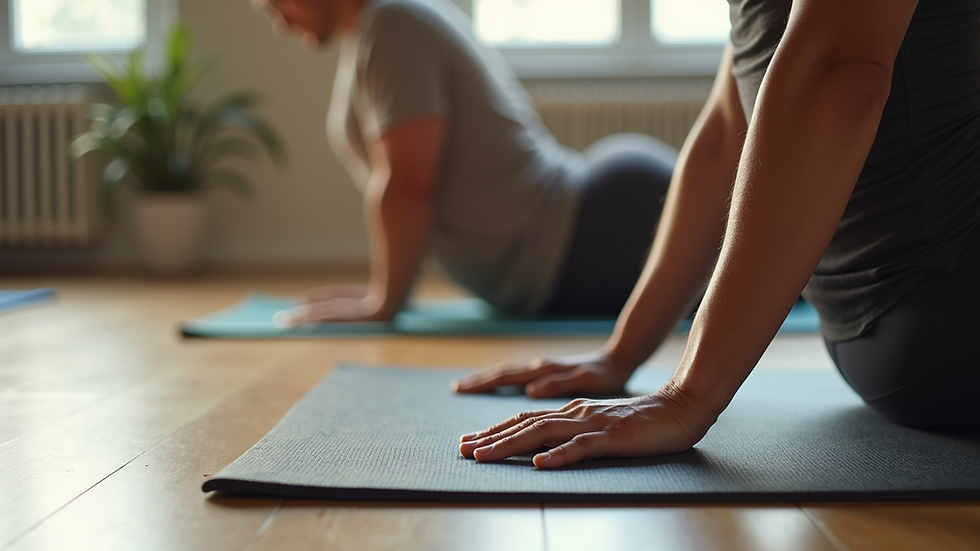Top Tips for Muscle Tension Relief in Athletes
- asmtherapy
- Jul 2, 2025
- 4 min read
Athletes push their bodies to the limit. Whether you are a runner, a swimmer, or a weightlifter, muscle tension can be a common issue. It can lead to discomfort, reduced performance, and even injuries. Fortunately, there are effective ways to relieve muscle tension. In this post, we will explore some top tips that can help athletes manage and reduce muscle tension effectively.
Understanding Muscle Tension
Muscle tension occurs when muscles are contracted and unable to relax. This can happen due to various reasons, including overuse, stress, or poor posture. For athletes, muscle tension can be particularly problematic. It can hinder performance and lead to injuries if not addressed.
Recognizing the signs of muscle tension is crucial. Common symptoms include stiffness, soreness, and a feeling of tightness in the muscles. If you experience these symptoms, it is essential to take action to relieve the tension.
Stretching: A Key Component
One of the most effective ways to relieve muscle tension is through stretching. Stretching helps to lengthen the muscles and improve flexibility. Here are some tips for effective stretching:
Warm Up First: Always warm up your muscles before stretching. A few minutes of light cardio can increase blood flow and prepare your muscles.
Hold Each Stretch: Aim to hold each stretch for at least 15 to 30 seconds. This allows the muscles to relax and lengthen.
Focus on Problem Areas: Pay special attention to areas that feel tight. For runners, this might be the hamstrings and calves. For weightlifters, it could be the shoulders and back.
Incorporate Dynamic Stretching: Before workouts, consider dynamic stretches. These involve movement and can help prepare your muscles for activity.
Massage Therapy
Massage therapy is another excellent way to relieve muscle tension. It can help improve circulation, reduce soreness, and promote relaxation. Here are some tips for incorporating massage into your routine:
Regular Sessions: Consider scheduling regular massage sessions, especially during intense training periods.
Self-Massage Techniques: Learn self-massage techniques using foam rollers or massage balls. These can be effective for targeting specific areas of tension.
Professional Help: If possible, seek a professional massage therapist who specializes in sports massage. They can provide targeted relief for muscle tension.
Hydration Matters
Staying hydrated is crucial for muscle function. Dehydration can lead to muscle cramps and increased tension. Here are some hydration tips:
Drink Water Regularly: Make it a habit to drink water throughout the day, not just during workouts.
Electrolyte Balance: Consider electrolyte drinks, especially after intense workouts. They can help replenish lost minerals.
Monitor Urine Color: A simple way to check hydration is by monitoring urine color. Light yellow indicates good hydration, while dark yellow suggests dehydration.
Proper Nutrition
Nutrition plays a significant role in muscle health. A balanced diet can help prevent muscle tension. Here are some dietary tips:
Protein Intake: Ensure you are getting enough protein to support muscle repair and growth. Lean meats, fish, beans, and nuts are excellent sources.
Anti-Inflammatory Foods: Incorporate foods that reduce inflammation, such as berries, leafy greens, and fatty fish.
Avoid Processed Foods: Limit processed foods high in sugar and unhealthy fats. They can contribute to inflammation and muscle tension.
Mindfulness and Relaxation Techniques
Stress can contribute to muscle tension. Practicing mindfulness and relaxation techniques can help reduce stress levels. Here are some methods to consider:
Deep Breathing: Take a few minutes each day to practice deep breathing. Inhale deeply through your nose, hold for a few seconds, and exhale slowly.
Meditation: Consider incorporating meditation into your routine. Even a few minutes a day can help clear your mind and reduce stress.
Yoga: Yoga combines stretching and mindfulness. It can be an excellent way to relieve muscle tension while promoting relaxation.
Rest and Recovery
Rest is essential for muscle recovery. Overtraining can lead to increased muscle tension and injuries. Here are some tips for effective rest and recovery:
Listen to Your Body: Pay attention to how your body feels. If you are experiencing significant muscle tension, consider taking a rest day.
Sleep Well: Aim for 7 to 9 hours of quality sleep each night. Sleep is crucial for muscle recovery and overall health.
Active Recovery: On rest days, consider engaging in light activities like walking or swimming. This can help promote blood flow and reduce tension.
Incorporating Technology
In today's digital age, technology can also aid in muscle tension relief. Here are some tools to consider:
Massage Guns: These devices can provide targeted relief for muscle tension. They work by delivering rapid bursts of pressure to the muscles.
Apps for Relaxation: There are many apps available that offer guided meditation and relaxation techniques. These can be helpful for reducing stress and tension.
Wearable Devices: Fitness trackers can help monitor your activity levels and remind you to take breaks or stretch throughout the day.
Seeking Professional Help
If muscle tension persists despite your efforts, it may be time to seek professional help. Here are some options:
Physical Therapy: A physical therapist can assess your muscle tension and provide tailored exercises and treatments.
Chiropractic Care: Chiropractors can help with alignment issues that may contribute to muscle tension.
Consult a Doctor: If you experience chronic muscle tension, consult a healthcare professional to rule out any underlying conditions.
Final Thoughts on Muscle Tension Relief
Muscle tension is a common issue for athletes, but it does not have to be a permanent problem. By incorporating stretching, massage, proper hydration, nutrition, mindfulness, and rest into your routine, you can effectively manage and reduce muscle tension.
Remember, every athlete's body is different. What works for one person may not work for another. It is essential to find the right combination of techniques that suit your needs.
By taking proactive steps to relieve muscle tension, you can enhance your performance and enjoy your athletic pursuits more fully.



Comments